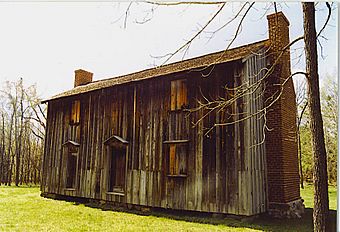Horton Grove facts for kids
Quick facts for kids |
|
|
Horton Grove Complex
|
|

Slave quarters at Horton Grove
|
|
| Location | North of Durham on SR 1626, nearDurham, North Carolina |
|---|---|
| Area | 3.5 acres (1.4 ha) |
| Built | 1850 |
| NRHP reference No. | 78001946 |
| Added to NRHP | March 17, 1978 |
Horton Grove was a special area on a very large farm, called a plantation, in Durham County, North Carolina. This plantation, known as the Bennehan-Cameron complex, was about 30,000 acres (about 121 square kilometers) and included Stagville Plantation. Horton Grove was where the houses for enslaved African-American people were located.
The powerful Bennehan and Cameron families owned the people who lived at Horton Grove. By 1860, about 900 enslaved people lived on this huge plantation complex. The buildings still standing at Horton Grove are important because they are the only two-story houses for enslaved people left in North Carolina.
Contents
Building the Homes at Horton Grove
The homes at Horton Grove were built in the early 1850s. Enslaved builders and craftspeople constructed them. These homes were the result of many years of improvements on the plantation.
Special Features of the Houses
The houses at Horton Grove were considered very well-built for their time. They had features like windows with shutters, more than one floor, brick chimneys, and strong stone foundations. These details made them stand out from other slave dwellings.
Life After Slavery
People continued to live in the Horton Grove houses for a long time, even into the 1970s. After the American Civil War ended in 1865, many formerly enslaved people stayed on the land. They became sharecroppers, meaning they farmed parts of the land and shared their crops with the landowner. They kept living in these same homes.
Why Horton Grove is Important
Because of its long history and unique buildings, Horton Grove was added to the National Register of Historic Places in 1978. This means it is recognized as a very important historical site.
Archaeologists have also studied the site. They found clues that show how African traditions continued at Stagville. For example, they found items like divining rods, which were used in some African spiritual practices. They also found evidence of communal cooking, where people shared food preparation.
External links
- Historic Stagville Foundation - official site
- Historic Stagville Foundation - Photos
- Photos of Horton Grove
 | Bayard Rustin |
 | Jeannette Carter |
 | Jeremiah A. Brown |



